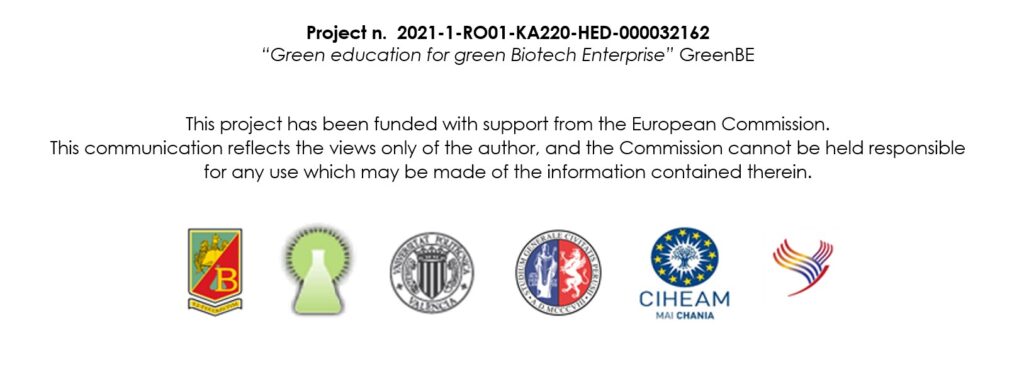
Foreword
The EC GREEN DEAL Action Plan has the ambition to make the EU’s economy sustainable, by boosting the efficient use of resources toward a clean, circular economy and by restoring biodiversity and cut pollution (EC Roadmap on Green Deal, Dec 2019). The final EU aim is to be climate neutral by 2050. EU institutions and all Member States (including the present partnership countries: RO, SP, IT, GR) are committing significant resources and are putting forward plans to make post-COVID-19 Europe a greener, more digital, and better fit for the current and forthcoming challenges of the continent. Green and digital transformation cannot be achieved without the consistent engagement of educational institutions and SMEs across the EU (EC Communicate on Green Deal, Dec 2019).
The Green Industry helps to solve environmental problems through the development of innovative solutions. Some companies go green either to reduce environmental harm or to gain consumer support. From energy sharing and ride-sharing to commodities trading, there is no limit to the kinds of industries green start-ups can tackle. Green Entrepreneurship started to be relevant after the 2012 EC Employment Package, which put emphasis on the need to further develop labour market tools and identify skills needs to support the transition to a green economy. Since then, Green start-ups seek to leverage technology to create environmentally-friendly products and encourage social good; meanwhile, green start-ups face unique challenges in attracting the right investors and competing with traditional growth-only focused entrepreneurs. Green start-ups face additional challenges brought on by their inherent triple bottom line: social responsibility, economic value, and environmental impact (people, profit and the planet) (Delventhal S., 2021).
When thinking about BIOTECHNOLOGY, people think of the cutting-edge development of drugs to treat diseases. However, the latest EC reports (EC Report on Bioeconomy, 2022) noted that industrial biotechnology and biobased manufacturing are more efficient, cleaner and make better use of sustainable renewable resources. In fact, biotechnology itself is one of the most promising sectors to support the sustainability mission (carbon-neutral, digital and circular society). Teaching and promoting sustainable/green practice among Biotech stakeholders (education, start-ups/enterprises, NGOs, etc.) is an important action of the Green Deal Pact. In this context, a question has been raised: how are universities playing their part in tackling this climate emergency? The universities can and should do more, particularly by becoming role models for wider society in their own environmental policies and targets. In addition to research and advocacy, universities have a duty to “teach our future leaders, who are going to be advocates of sustainability and take action on sustainability” (Times, 2020).
Despite its rapid growth, the relatively new field of green studies is still at its infancy, and even more in Biotech Green Entrepreneurship. Education plays a crucial role in fostering the eco-entrepreneurial consciousness of future Biotech Green innovators, entrepreneurs, and employees in the circular bioeconomy and climate change solutions’ finding. The need for new green skills and attitudes is growing with a growing consumer interest in clean, ethically-sourced products, while at the same time appropriate educational content for the development of such skills in high education is extremely scarce.
The present training/learning material in “Biotech Green Entrepreneurship” was designed to be taught by blended-learning tools to Master and PhD students in Life Sciences/Biotech & Business. This action-oriented course aims to inspire and develop Biotech Green entrepreneurial knowledge, skills and competences of the Life Sciences/Biotech, as well as Business students. The content approaches several topics, like concepts and principles in Green BioEconomy, specific elements of entrepreneurship in the biotechnologies sector, entrepreneurial economic performances in green biotech, promotion and business management in green biotech, risks and benefits in Green Biotech Business, financial aspects of green biotech, as well as ITC technologies and tools for green biotech entrepreneurship. In addition, the material provides a mapping of local Green Biotech business in the countries of the Erasmus + (2021-1-RO01-KA220-HED-000032162) project partnership, respectively Greece, Italy, Romania and Spain.
Translated Course:
- GreenBe Course ESP [Emprendimiento en biotecnología verde ]
- GreenBe Course RO [Antreprenoriat în Biotehnologiile Verzi ]
- GreenBe Course IT [Imprenditoria verde biotecnologica]
- GreenBe Course GR [Βιοτεχνολογική Πράσινη επιχειρηματικότητα]
- GreenBe Course ESP-Catalan [Emprenedoria en Biotecnologia Verda]
PowerPoint Presentations from the Course in ENG:
- Specific elements of green biotech entrepreneurship
- Risks and benefits in Green Biotech Business
- Promotion and Business Management Strategies
- Programs and platforms that support the Green Biotech Entrepreneurship
- Financial aspects of green biotech
- Entrepreneurial economic performances
- Mapping of local Green Biotech Business
- ITC Tools